"I offered him to make an old dream of his come true – to go on a trip around the world. But he went to war instead" – stories of foreign soldiers who died fighting for Bakhmut
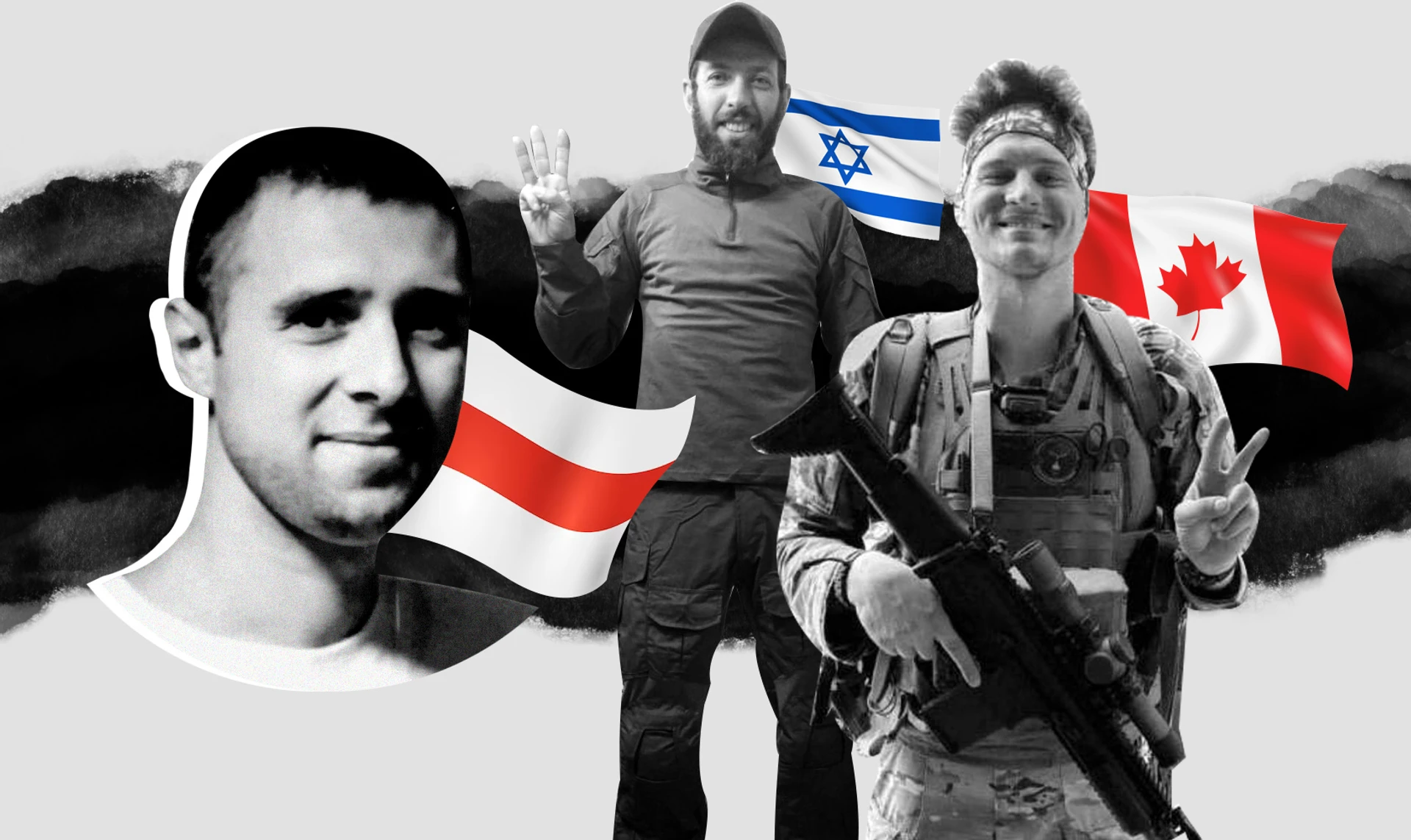
Bakhmut and its outskirts have become a symbol of fierce battles with huge losses. Not only Ukrainian soldiers are dying in the battles for the city, but foreign volunteer soldiers are, as well. We are recounting the stories of the Canadian Hryhoriy Tsekhmistrenko, the Israeli Dmytro Fialka, and the Belarusian Aliaksei Veshchavailau, who sacrificed their lives defending the independence of Ukraine.
This text was prepared by the Memorial memory platform that tells stories of the Ukrainian military and civilians killed by Russia, exclusively for Ukrainska Pravda.
Hryhorii Tsekhmistrenko

Switzerland found its national hero in 1386. Arnold von Winkelried took hundreds of enemy spears during the Battle of Sempach and kept the enemy troops from advancing with his own life while his brothers-in-arms encircled the army of Leopold III of Austria and defeated them, defending Switzerland's independence.
Arnold von Winkelried became a classic example of self-sacrifice for the sake of one's country. Hryhorii Tsekhmistrenko, a Canadian citizen born in Ukraine, loved this story very much and chose it as his life motto – to serve and live for the sake of others. Everyone who knew him agrees – Hryhoriy consistently followed this principle.

Hryhoriy Tsekhmistrenko was born on 19 December 1994 in Rivne in the family of Vitalii Tsekhmistrenko, the head and founder of the Rise agricultural holding. However, the wealth did not corrupt the boy in any way – he was honest, goal-oriented and incredibly sympathetic to other people and their problems.
His father recollects that his son came to him when he was nine years old and said: "Dad, I want to give my heart to the Lord." From that day and until the end of his life, Hryhoriy faithfully tried to serve God.
"He carried the light, and this light was not artificial, it came straight from his heart," says Vitalii Tsekhmistrenko.
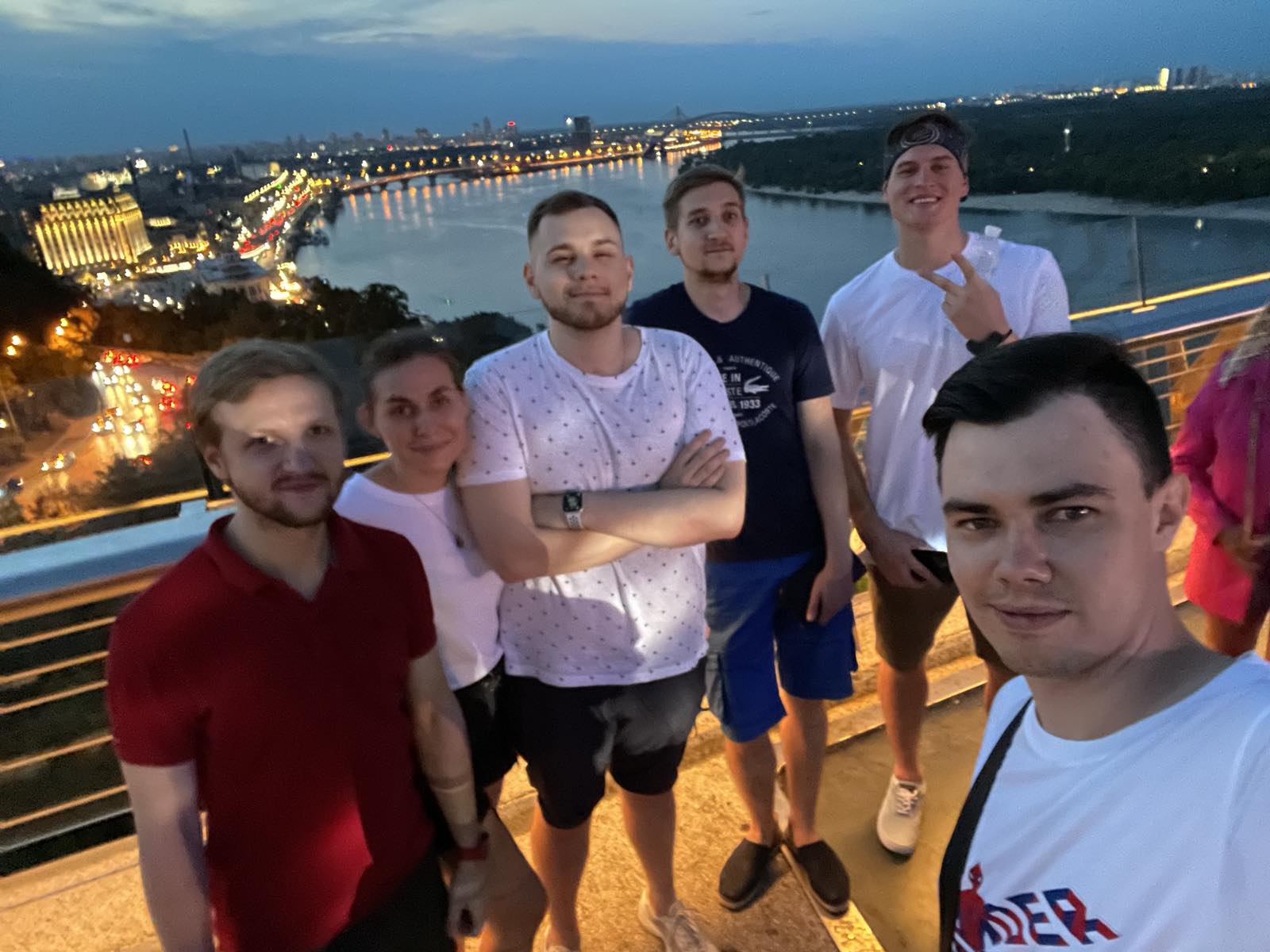
Later, when Hryhorii's father became an MP of the Verkhovna Rada of Ukraine [the parliament – ed.], the family moved to Kyiv. The boy went to School No. 89 in the Pecherskyi district of Kyiv. His classmate and friend Oleh Diachok has reminisced that when Hryhorii first came to their class, he immediately declared that he would tie his future with the army.
[BANNER1]"Someone dreamed of becoming a policeman, someone – an astronaut, and Hryhorii said right then and there: ‘I want to be a soldier.’ And that's where he headed without slowing down. Even then, behind his school desk, fighting for his country was the highest honour to him, and he told us about it several times," recalls Oleh Diachok.
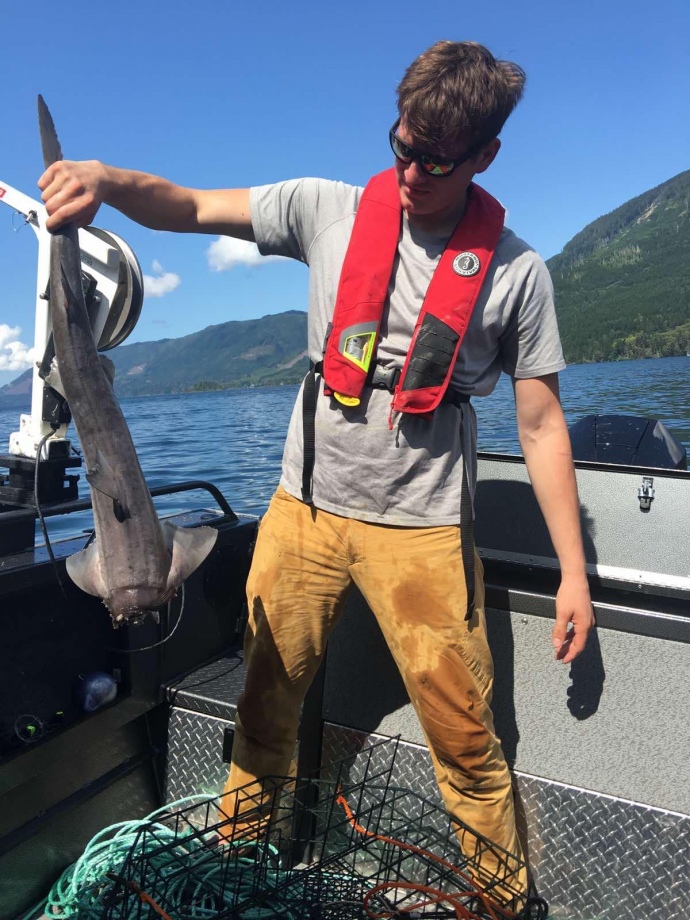
Hryhorii was a well-rounded boy – he studied English and Spanish, played chess, rugby and volleyball, did taekwondo, swimming and snowboarding, went canoeing and kayaking. In 2011, when Hryhorii was 16 years old, the Tsekhmistrenko family moved to Canada where they later received citizenship. Hryhorii always kept moving towards his goal – he took tactical medicine classes in several different countries, attended various military exercises – in the USA, Poland and the Czech Republic.
"He trained a lot to become a real warrior. He earned money for various courses during summer working in construction and doing other hard tasks. If everything had worked out differently, I am convinced that he would easily have been selected for the Special Operations Forces of Canada or the US and would have taken a deserved place among the best soldiers," says Oleh Diachok.

In between his studies, Hryhorii actively travelled around the world, worked in hospitals in Mexico, Tanzania and countries of South Africa, and helped Christian missionaries in Zimbabwe.
Hryhoriy was amazed with Norway and Iceland. Nevertheless, Ukraine always remained his motherland. He often came there to see his friends and visit relatives. In 2014, when the Revolution of Dignity began, Hryhorii returned to Kyiv to be with his friends at the barricades.
"He arrived at 13:00 and went straight to the Maidan [the main protests of the Revolution of Dignity took place on Maidan Nezalezhnosti (Independence Square) in Kyiv in 2013-2014 – ed.]. When the first avalanche of police came there [to attack the protesters], he was among those who stayed and defended the barricade to the end," says Vitalii Tsekhmistrenko.
Hryhorii was wounded that day, he received a concussion and was detained by the police. His parents were looking for their son at the barricades. The mother was holding his picture and asking: "Have you seen this man?" Hryhorii’s fellow protesters recognised him. It turned out that they had given him a call sign Hoverla [Hoverla is the highest peak of the Ukrainian Carpathians – 2,061 metres – ed.] – because he was a tall man and had a heart as big as a mountain.
"When we freed Hryhoriy, I asked: 'Son, why did this happen?' He replied: ‘When they started advancing, many of those who were at the barricades got scared of that force and started to run away. We along with several other men picked up shields and sticks and held the attackers back as long as we could," Vitalii Tsekhmistrenko recollects.
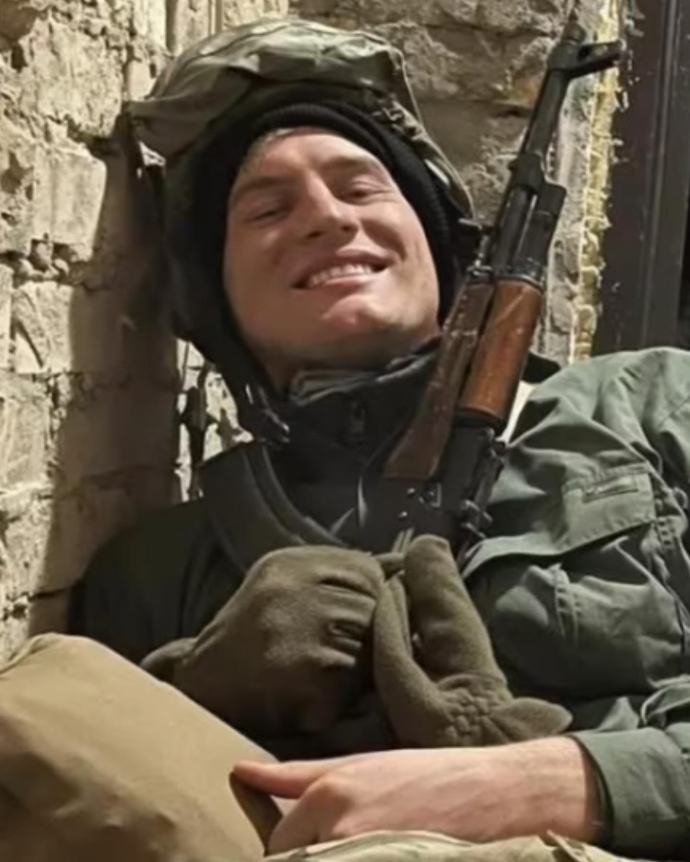
Hryhorii anticipated that there would be a great war, and he shared these thoughts with his parents and friends multiple times. His family tried to talk their son out of participating in any potential combat actions. But they did not succeed.
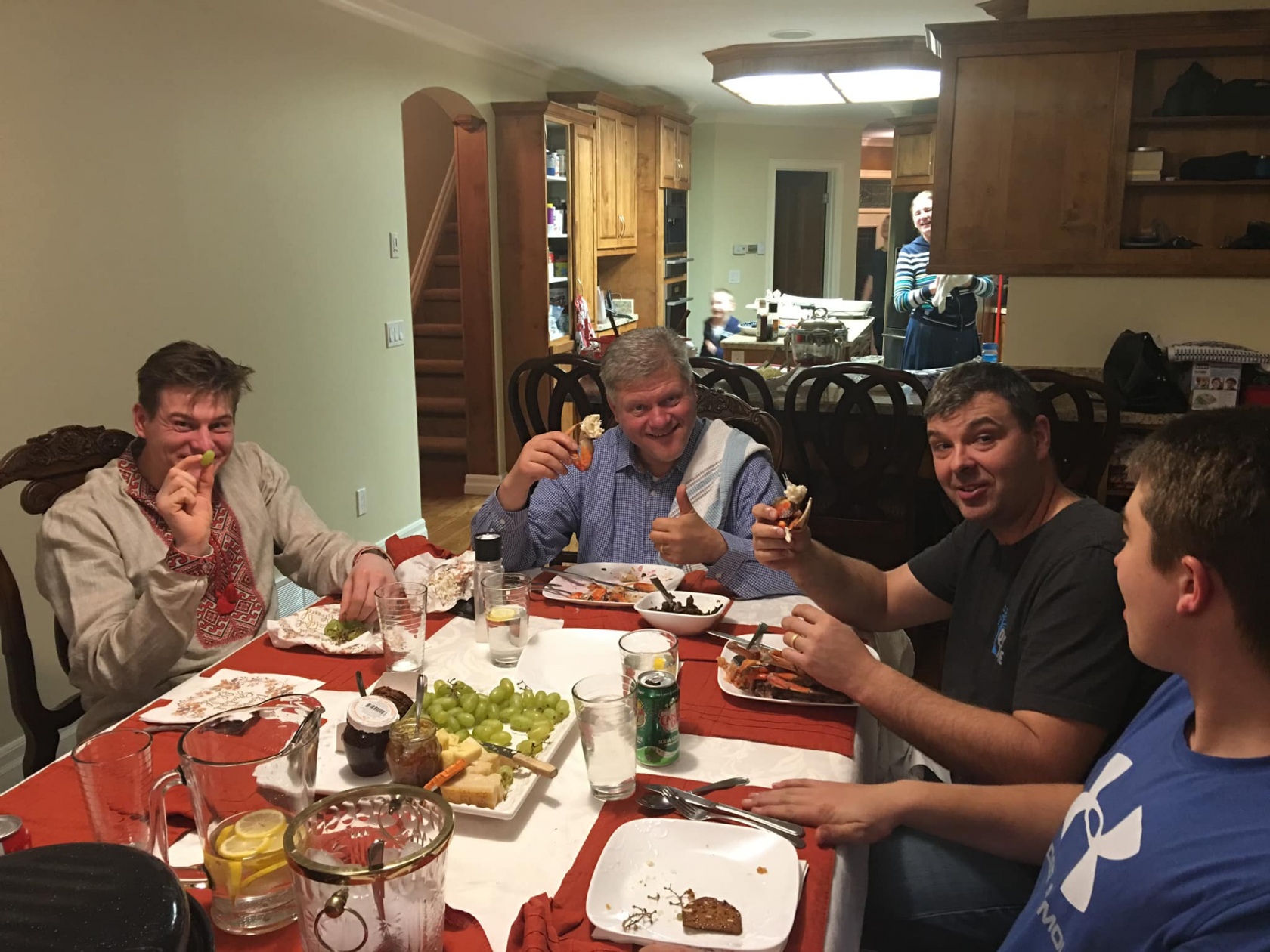
"I offered Hryhorii to make an old dream of his come true – to go on a trip around the world on a sailing yacht. But his friend with whom he was going to travel decided to go fight at the front, and Hryhorii joined him. He consciously made that choice despite the fact that he was a very wealthy person. He had no parents to protect in Ukraine, but he still went to war – for his motherland," says Vitalii Tsekhmistrenko.
On 17 February 2022, Hryhorii Tsekhmistrenko came to Kyiv from Canada. During conversations with his friends, he repeatedly emphasised that Russians were definitely going to attack any day then. Hryhorii himself was ready for it. He never questioned his choice.
"When explosions rocked Kyiv on 24 February, Hryhorii immediately put on his uniform, packed his belongings and headed out to a prearranged gathering point for the legionnaires. He was clearly aware of what he was doing and where he needed to be at that moment," says Oleh Diachok.
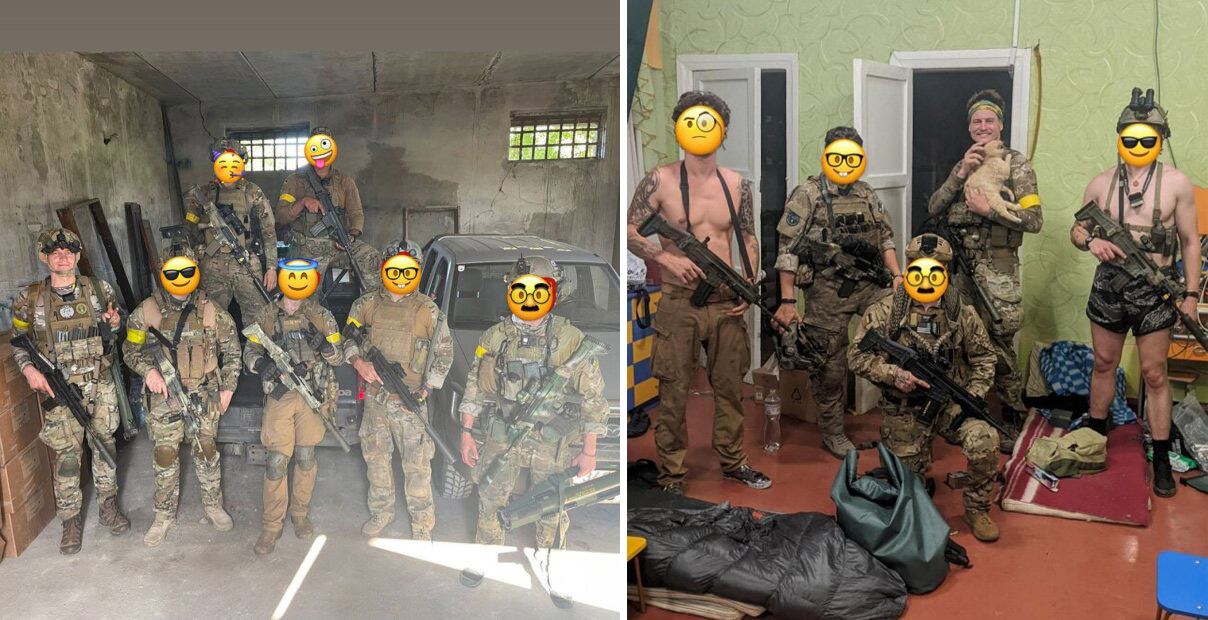
At first, Hryhorii fought as part of the Azov Regiment. He had a call sign Dürer there – in honour of a well-known German Renaissance painter. He fought the Russians in Hostomel, defended Moschun and fought on the Kherson front. Later, he joined the Special Operations Forces of the International Legion. He picked a call sign Hreh there. His friends also point out that Hryhorii respected the "classified" label on all the war-related information and never told his friends or his parents what and where he was doing. Usually, he could only share some funny stories that happened to him.
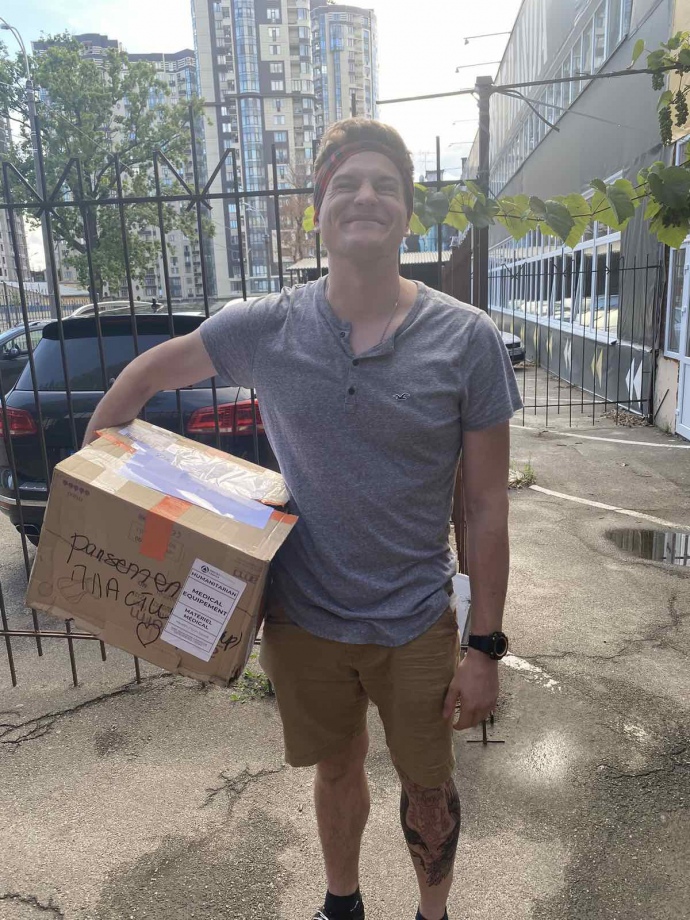
Hryhoriy Tsekhmistrenko, a combat medic, actively promoted helping the army on his Instagram account, he made reports on donations and things they had received from volunteers. When he rarely came to Kyiv for a short leave, he always met up with his friends. And the next day, he went back to the front to save the lives of wounded brothers-in-arms.
On 8 January 2023, Hryhorii spent the last evening with his family – they read the Bible, listened to a preacher's sermon and talked a lot at a home prayer meeting. He headed to Bakhmut the very next day.
[BANNER2]Hryhorii Tsekhmistrenko was killed there on the night of 14-15 January. As his brothers-in-arms say, Russian troops hit his position with a hand-held grenade launcher. After the first strike, two soldiers of his group received serious injuries and Hryhorii ran over to help them. The Russians struck for the second time shortly after. There was an explosion right behind Hryhorii. He died while covering his wounded brothers-in-arms with his body. Hryhorii was 28 years old. For his bravery and courage, he was posthumously awarded the Order for Courage.
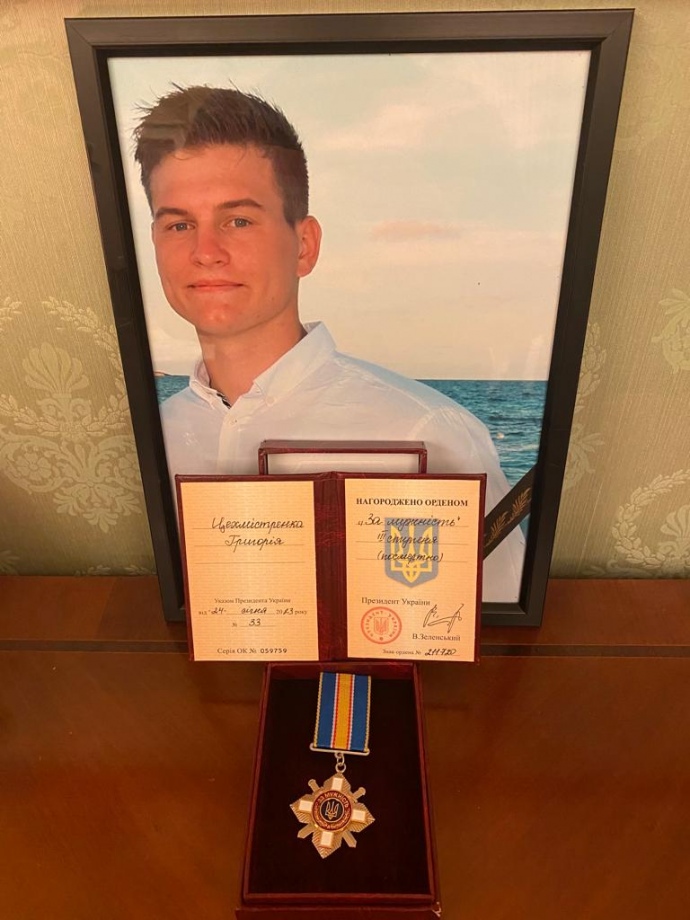

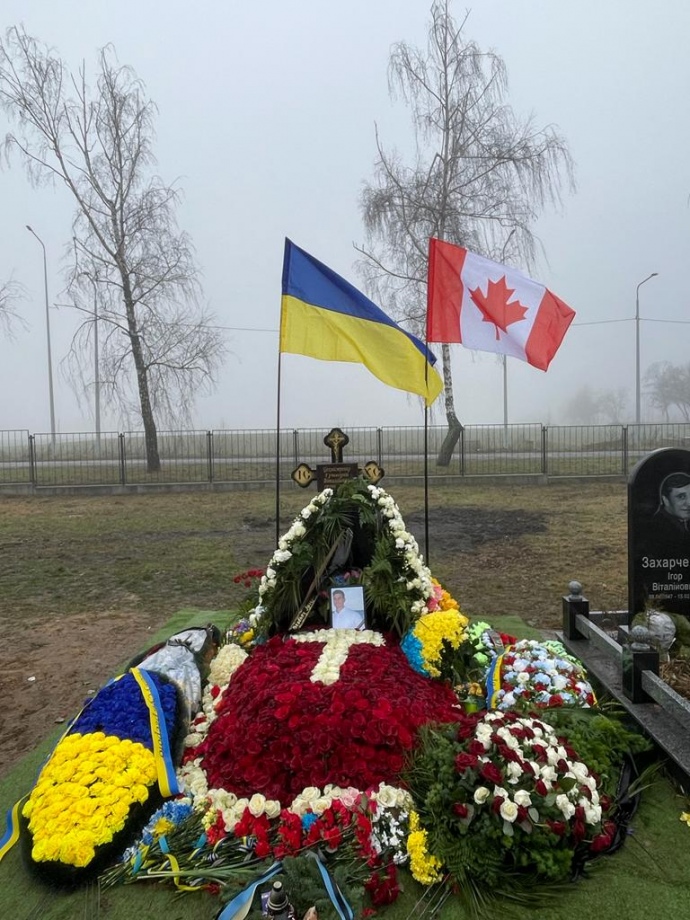
On 20 January 2023, the farewell ceremony was held in Kyiv. Hryhorii was buried in the village of Chabany in Kyiv Oblast. There is a huge canvas of red roses with a white cross and two flags flying above – Ukrainian and Canadian ones.
"Hryhorii loved God, he was a true Christian and tried to follow Jesus Christ in his actions. He never judged anyone. During the Maidan, he often came home without his jacket, and we would ask him: ‘Where are your clothes, son?’ And he would reply: ‘I gave it to someone who needed it more’... My wife and I did not say ‘goodbye’ to Hryhorii, we said ‘till the next time, son’. We know where he is now and we will meet him there," says Vitalii Tsekhmistrenko.
Dmytro Fialka

On 1 September 2022, a seven-year-old Lina Fialka went to the first grade. The little girl knew that her mother was the one taking her to school because her father Dmytro was defending her at the front. Dmytro went on his last combat mission that day. And when Lina was singing the national anthem of Ukraine on her first day of school, her dad's life was cut short by a Russian bullet.
"I couldn't believe that it happened until the very end. I just couldn't comprehend that such things could happen to me. Seven years of our life together were like one endless honeymoon, and such happy stories simply could not end like this," says Yeva Fialka, Dmytro’s wife.

Dmytro Fialka was born in Lviv on 21 June 1983. He was fond of football since he was a child. At the age of 15, he moved to Israel under the repatriation program. He graduated from school there, served in the army and received Israeli citizenship. He became the coach of the Maccabi youth team in the city of Be'er Sheva. Under his leadership, the club entered the top youth division. Fialka's friend and colleague Yaroslav Bits, the head of the Dynamo Lviv football club, recalls that he was impressed by Dmytro’s coaching skills when they first met.
"He was passionate about football, he had a great desire to do it. He was on a much higher level than we were here, he was extremely competent in absolutely everything when it came to football, and he was ready to work as a coach, despite our very limited funding."
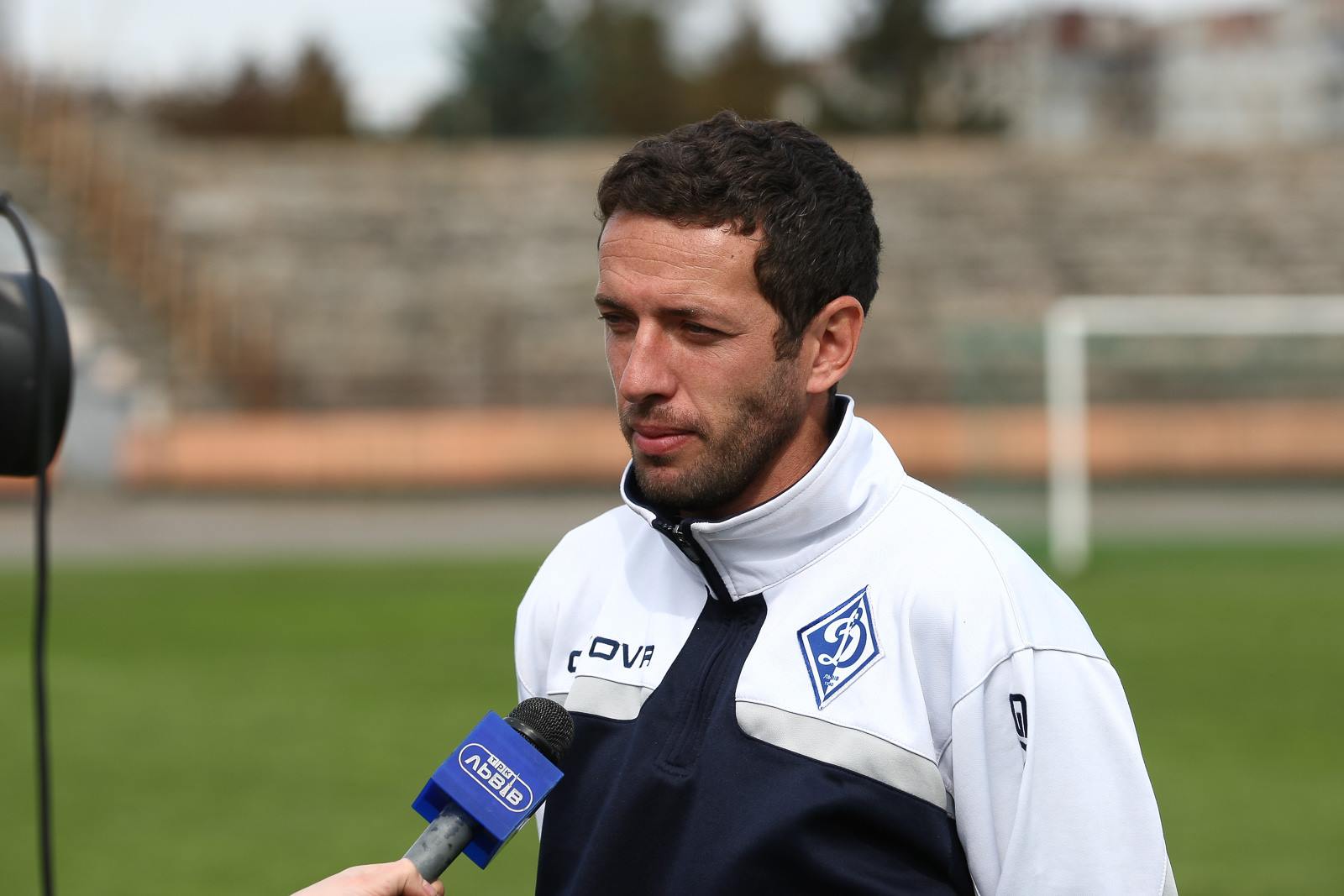
Yaroslav Bits met Dmytro in 2015. A year before that, Fialka returned to Lviv to take care of his ill grandmother whom he loved very much. And it was the time when he met his future wife Yeva.
Yeva and Dmytro got married the next year, in 2016. They had two children. Dmytro loved his daughter and son very much and always spent time with them. The family liked travelling, they often went to Ochakiv, a sea resort in Mykolaiv Oblast.
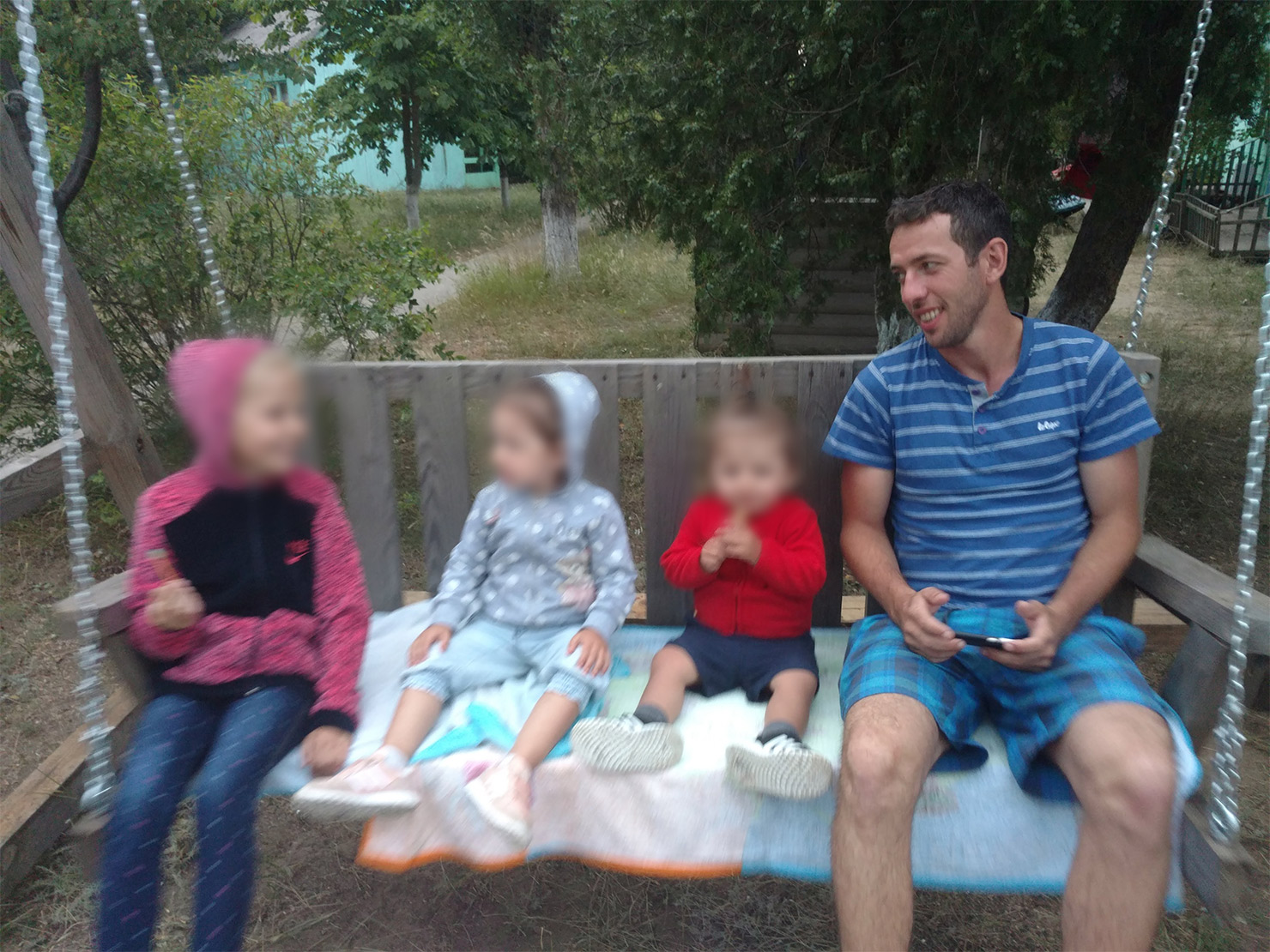
"The sea in Ochakiv and the steppe nearby were very quiet. We lived on a hill above the sea in houses made of containers at a recreation centre. One evening, we were sitting with him on a cliff, Dima was drinking beer, I was drinking lemonade because I was pregnant with his son at the time. Dima looked at the sea and said: ‘You know, this is what happiness probably is.’ And it was," recalls Yeva Fialka.
Dmytro worked as a coach of the Lokomotyv children's football team in Lviv. Both the children and his work colleagues adored him. Dmytro constantly was on the path of self-improvement and took various classes.

"He made a Viber group chat with about 3,000 football coaches from all over the world. He absolutely selflessly shared his expertise which he had gained at paid classes with them. In 2020, Dmytro applied for a position of a coach at the Shakhtar football club. And he was in the top-10 candidates out of 3,000 applicants. The club management was stunned with his level – no one in Ukraine knew about Dmytro at the time and his appearance in the list of top-10 candidates caused a sensation," says Yaroslav Bits.
[BANNER3]Eventually, Dmytro Fialka started working as a coach at the Lviv football club where he trained young men born in 2003. In the last Ukrainian Football Cup, his team beat Dynamo Kyiv and reached the final. And then the full-scale war started.
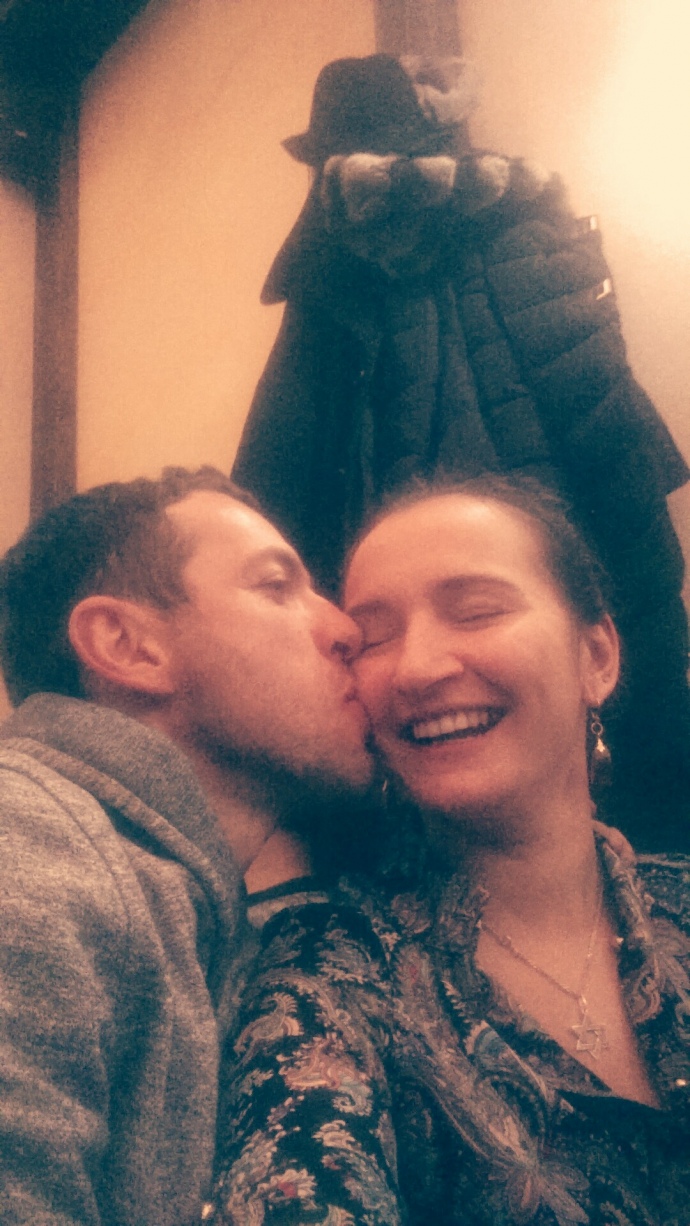
A few days before 24 February, Yeva and Dmytro had discussed the possible offensive. The threat could be sensed in the air but her husband was convinced that Russians would be afraid of invading Ukraine. On the morning of 24 February, Dmytro was sleeping with the children while Yeva just woke up to go to work. And then, her mother came in and told them that Russians were bombing Kyiv.
"I walked around with my eyes wide open and couldn't believe it was true. And Dmytro packed his belongings and said: ‘I'm going to an enlistment office’," recalls Yeva.
In 2006, while serving in the Israeli army, Dmytro took part in the war against the Lebanese Hezbollah. He was an operator of the Spike anti-tank system in the army. He took its name as his call sign when he went to war against Russians.
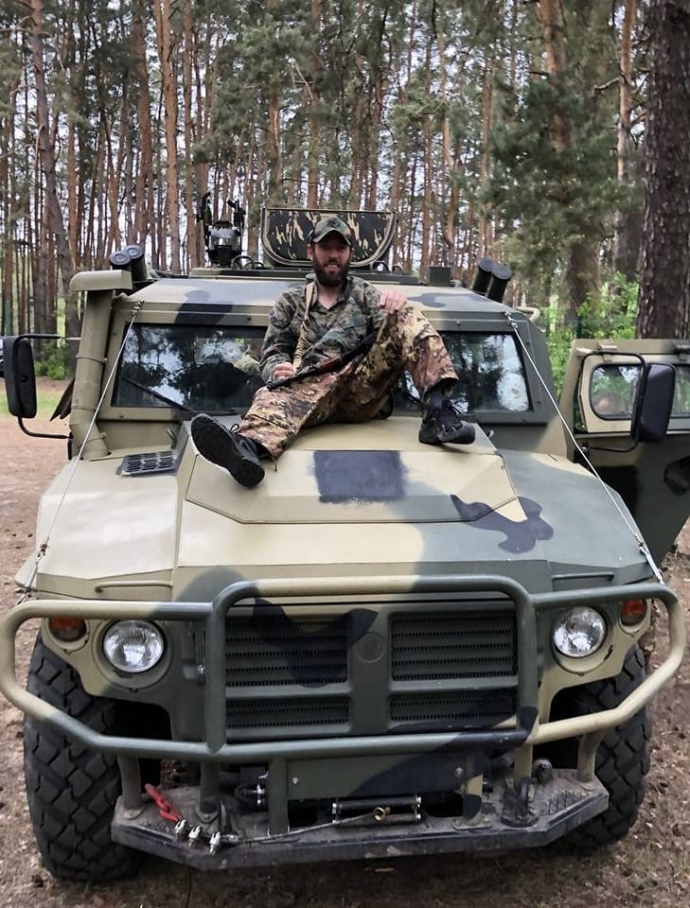
The enlistment office in Lviv refused him to go to war, as he did not have any military registration documents despite his previous combat experience. The Territorial Defence Forces also did not accept him. Then, Dmytro turned to the Lviv branch of the Pravyi (Right) Sector. On the same day, he became one of their instructors.
"Everyone tried to talk him out of it, except for me. I just knew, and he knew as well that he had made the right choice even though he could just not go to war at all and instead go abroad with us. No one could talk him out of it. He had decided to go to war even before the full-scale invasion began. All because he loved Ukraine so much. And he was ready to do everything for it," says Yeva.

His wife and children went to stay with his family in Israel in the first weeks of the Russian full-scale invasion of Ukraine. At first, Dmytro trained soldiers at the training ground, then he went directly to the front line. His wife had not known that he had been taking a direct part in combat actions until May when she came back home with their children. Dmytro told Yeva about it during his short leave.
"He never complained. He was very calm. He told me that there was shooting, that there were battles, that there were killed soldiers. But he never said that he was tired, that he wanted to go home. He was sure he was doing the right thing. He knew that he was fighting for his country and his children," says Yeva Fialka.
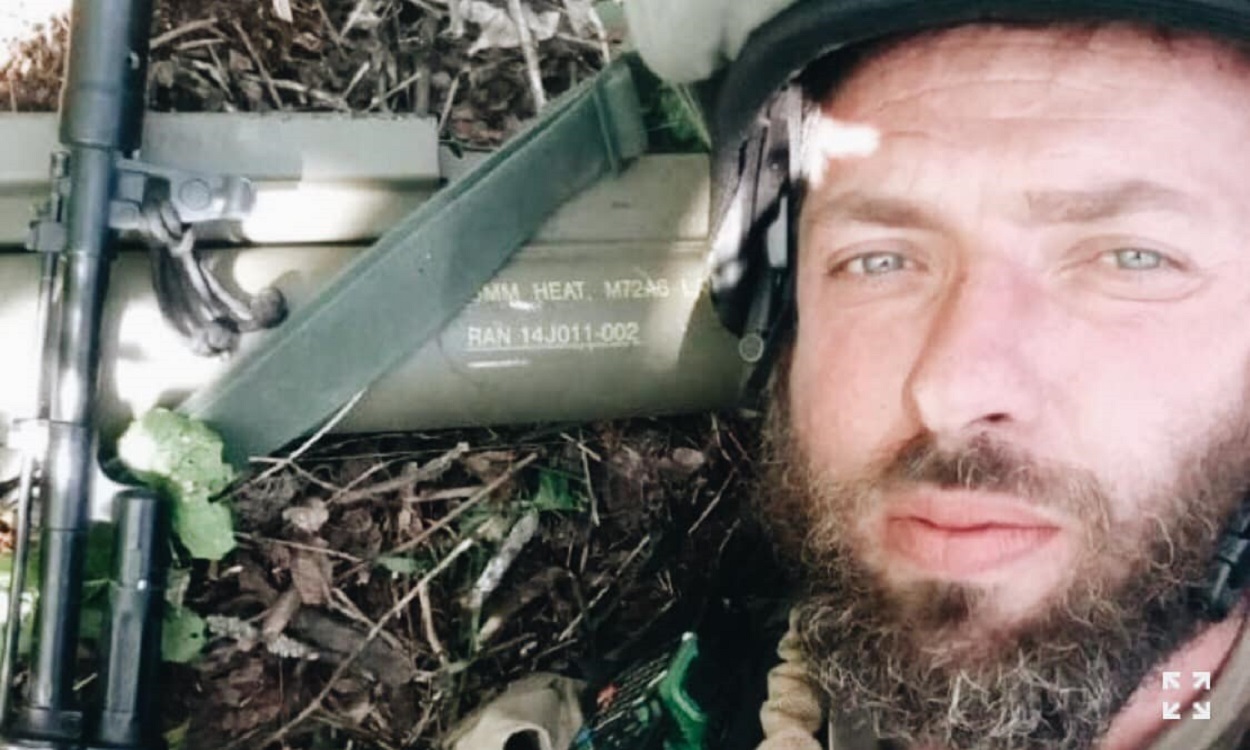
On 31 August, Dmytro called his wife for the last time. They talked for three minutes. He said that he was very tired because he had woken up at 03:00 and now he was going to sleep. The next morning, Yaroslav Bits called Dmytro. And Dmytro was emotional as he was telling Yaroslav that their vehicle was shot, they were in the middle of shooting and they were now returning to the base. Then, the connection was lost.
On the morning of 3 September, Dmytro`s commander called Yeva to tell her that her husband had been killed. He could not be evacuated from the battlefield because of hostilities, and his body was taken by the Russians. Negotiations on the exchange lasted more than a month – the occupiers were sure that Dmytro was a high-ranking officer and wanted to swap him for captured high-ranking Russian officers. Due to diplomatic efforts of both states – Ukraine and Israel – Dmytro's body finally was returned home.
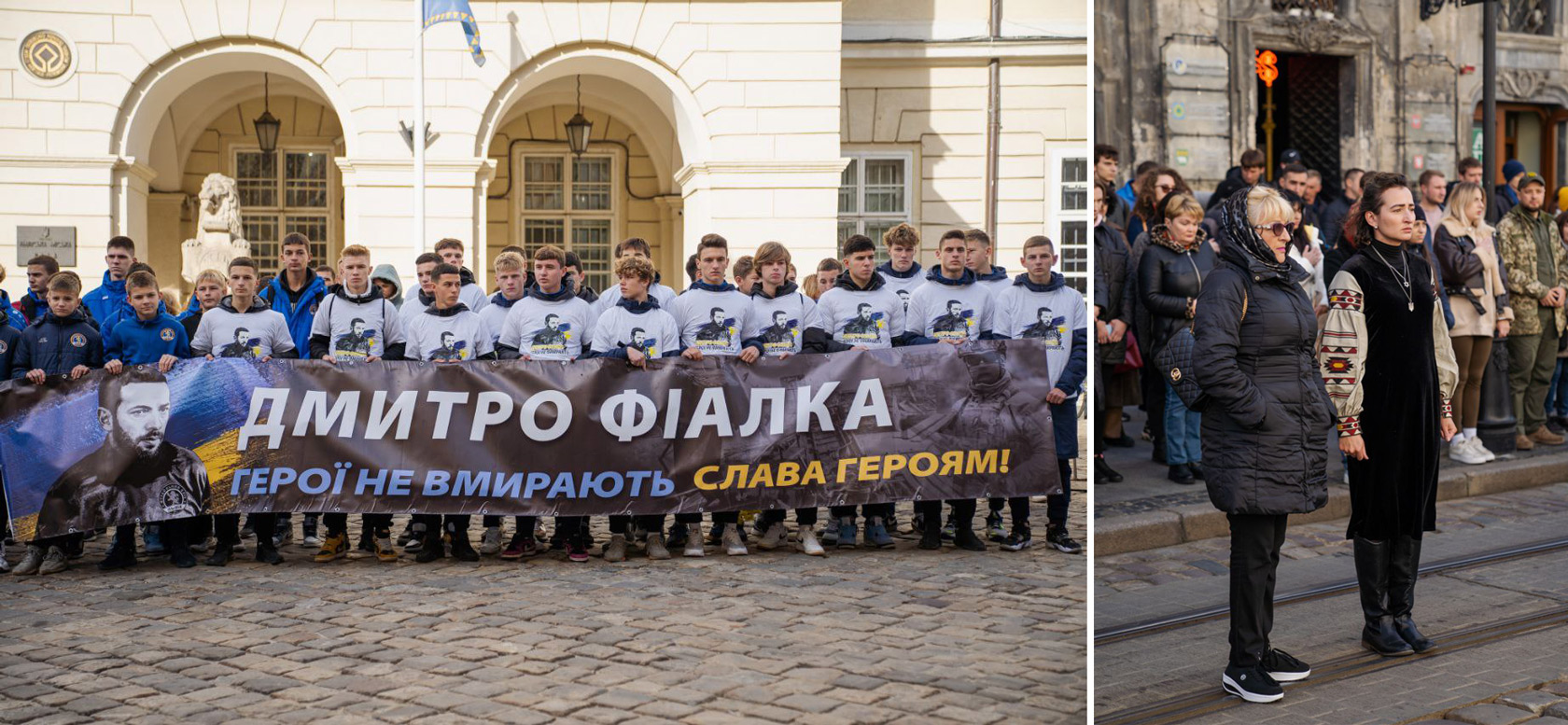
Dmytro bequeathed to be buried in Lviv in the Jewish section of the Yaniv cemetery beside his grandfather and great-grandmother. His students came to the Rynok Square to say goodbye to Dmytro wearing t-shirts with the coach's portrait and holding a banner in his honour.
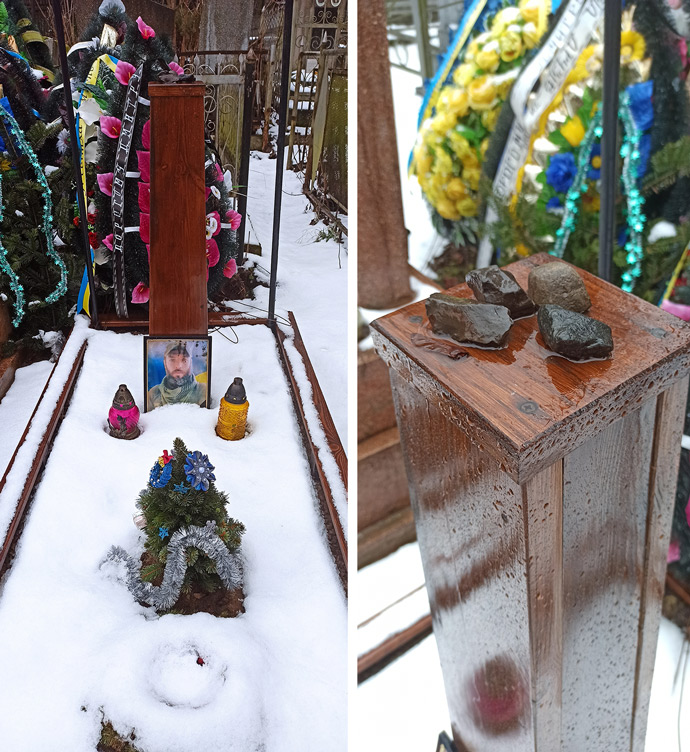
A temporary wooden headstone stands over Dmytro's grave in the cemetery. There are the stones brought by his family from Jerusalem on the very top. In memory of Dmytro, Yeva got a tattoo on her arm. There are two dates – and a short line that symbolises such a long and happy life between them.
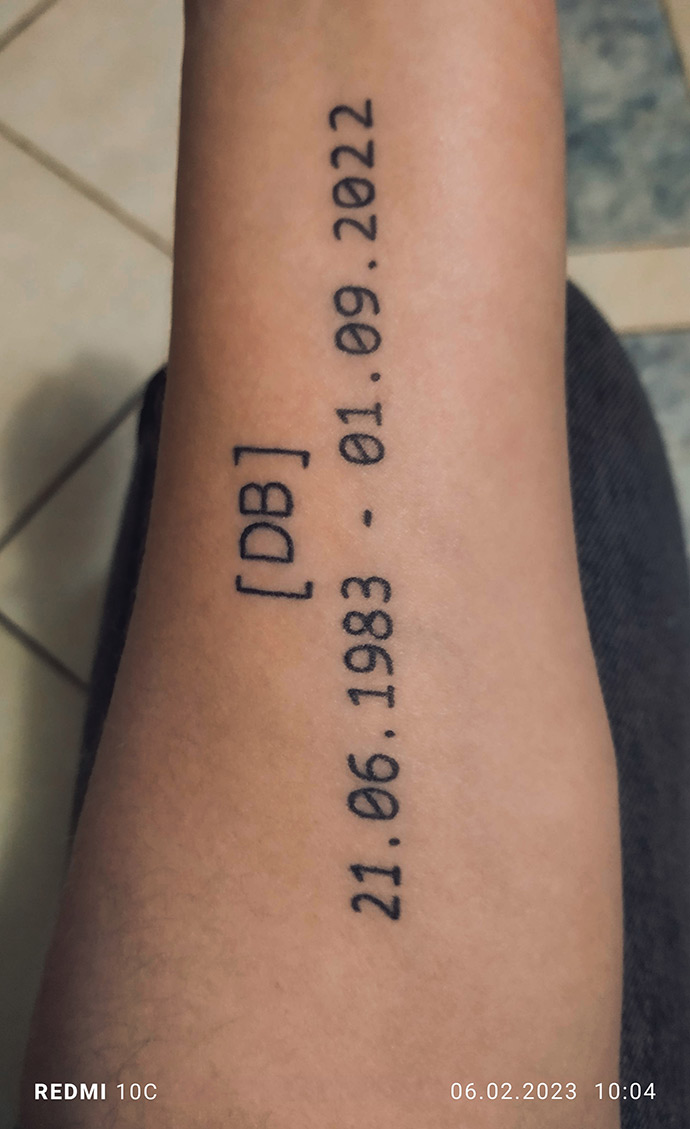
"Everything reminds me of my husband. Every corner of Lviv where we walked, our favourite restaurant. We have an arch over the stairs at home and every time he walked through it he would crunch his fingers against it. Every time I pass by it, I remember him."
Yaroslav Bits believes that the best way to honour Dmytro`s memory would be a football tournament in his name. Fialka's friends in Israel are planning to do the same. A tree was planted in his honour at his school. Both Yeva and Yaroslav believe that his memory has to live on and everyone has to remember the heroism of Dmytro who gave his life for Ukraine.
Aliaksei Veshchavailau
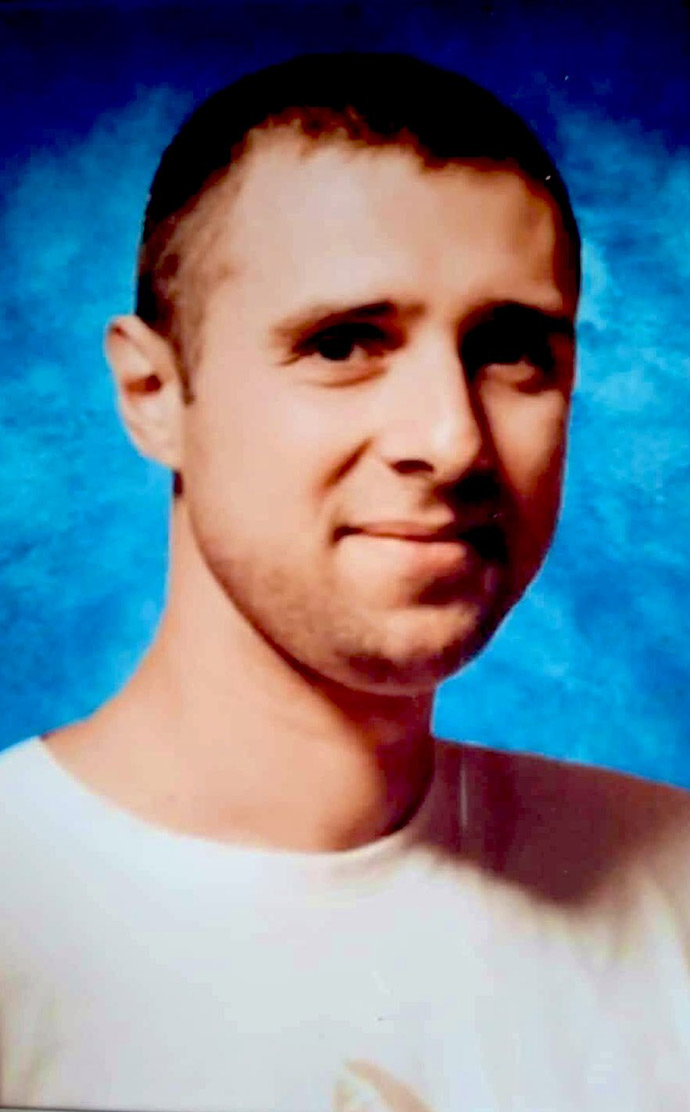
The ethnonym of the word Erzya – the Finno-Ugric people that live on the territory of modern Russia – can be translated as both "a man" and "a hero". Erzya Aliaksei Veshchavailau who was killed in action near Bakhmut on 26 September 2022 while defending Ukraine, was undoubtedly a real hero. He had a call sign Friend Lyeday, which means "reaper" in the Erzya language.

Aliaksei was born in Gomel, Belarus, on 18 January 1991. He studied to be an electric welder. In 2011, he got accepted into the extramural department of the Polotsk State University. He had parents, a wife and two children – a daughter and a son. It was an ordinary life at first glance. But a warrior that deliberately gave his life defending the country that had become his home hides behind these dry biographical facts.
[BANNER4]Yurii Riabyi, a brother-in-arms and friend of Aliaksei Veshchavailau, recalls that Aliaksei first came to Ukraine during the Revolution of Dignity where he took an active part in. Back then, being inspired by freedom and the Belarusian citizen at the same time, Aliaksei decided that Ukraine had the potential to help liberate indigenous peoples oppressed by Russia among which were the Aliaksei`s Erzya people.
"He craved change. He consciously wanted to live here and not only observe the changes from the outside but also be a part of them. He really wanted things to change in Belarus. But he said that the vast majority of the population had not yet been ready for it. While here – in Ukraine – he saw that something could be done," says Yurii Riabyi.
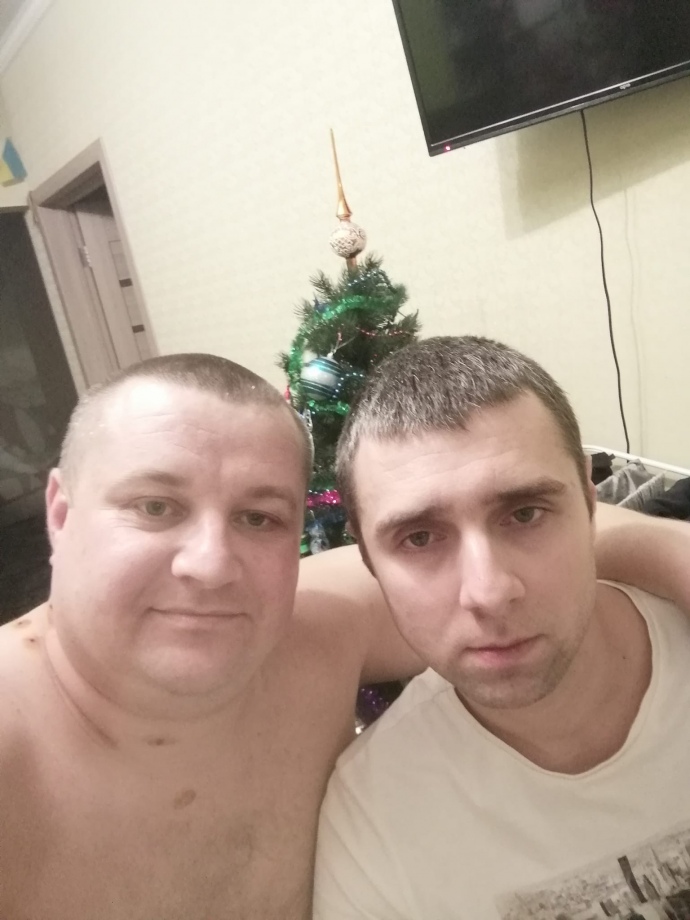
Yurii met Aliaksei in 2017 through his son Volodymyr. Together with Aliaksei, Volodymyr fought in the OUN Battalion and they often came to Talne to visit Volodymyr's parents. In a very short time, Liokha, as Yurii called Aliaksei, became a very close friend to their family and later he came to them on rotations and holidays.

Aliaksei Veshchavailau starteg his military career in Ukraine in 2015 in the Pravyi (Right) Sector ranks, transferring to the volunteer battalion of the OUN later, and in joining the 72nd Separate Mechanised Brigade named after the Black Zaporozhians in 2017 where he served as a machine gunner. He fought in all the hot spots and received a medal for defending Avdiivka.
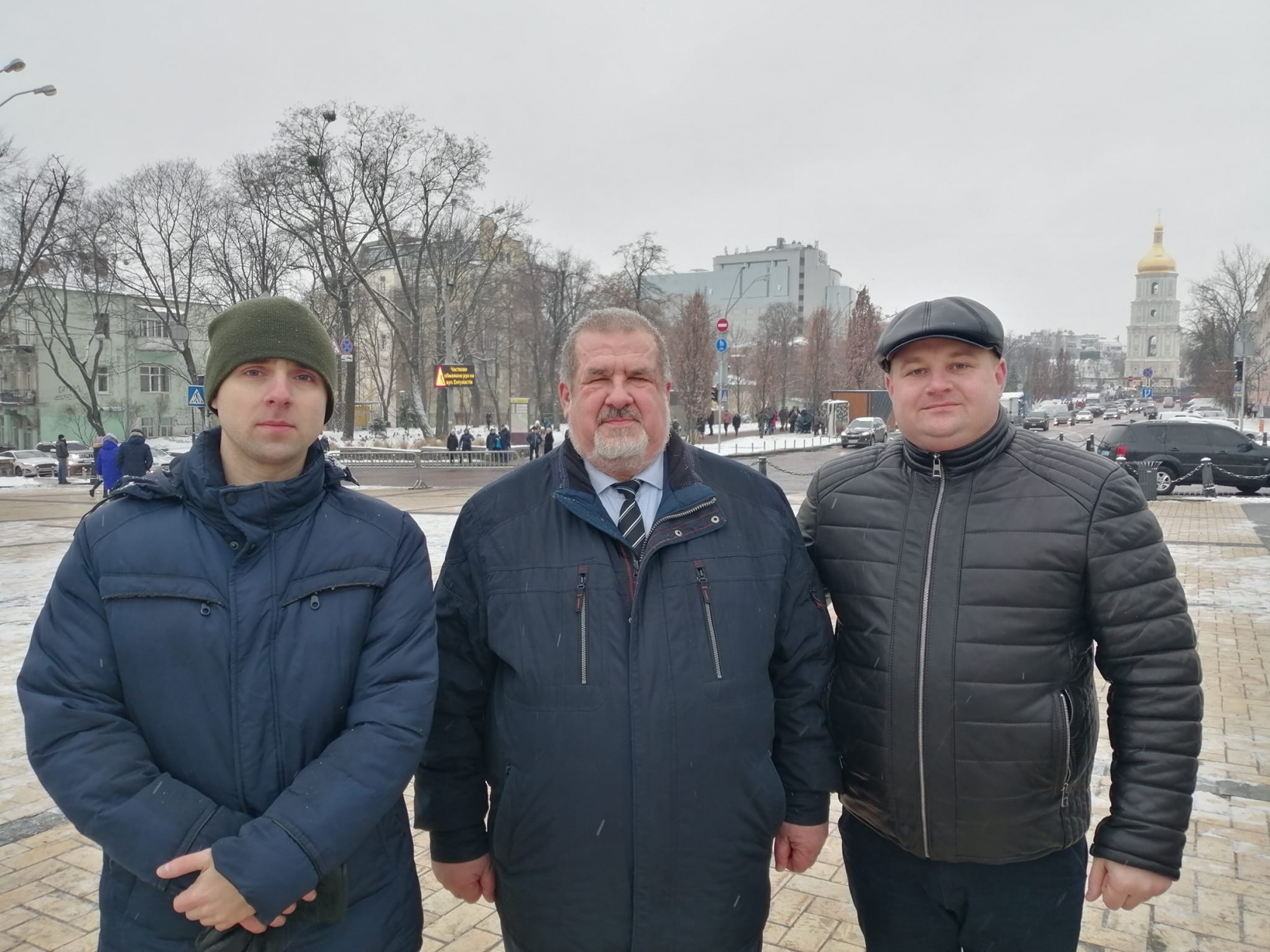
In 2017, Aliaksei Veshchavailau signed a contract with the army. After three years of service, he was to receive Ukrainian citizenship. But in January 2019, when he had only one year left to serve, Aliaksei was allowed a leave and decided to go to Belarus to visit his parents and his partner. He always travelled by train but this time he decided to go by bus to save time.
"It was the bus driver who handed him over. Liokha foolishly flashed his Ukrainian military ID and he also had a flag of his unit with signatures of his brothers-in-arms at the bottom of his bag. The driver immediately ‘ratted him out’ to the KGB. The KGB agents took Liokha off the bus," says Yurii Riabyi.
Yurii recalls that in February 2019 he received an envelope without a return address with a Belarusian stamp on it. There were only several words in the letter: "Aliaksei was arrested. Let everyone know." It was Aliaksei’s grandmother who secretly wrote and sent the letter. At that time, he himself was being held in a detention centre where investigators put him under pressure demanding that he confess to being a mercenary.
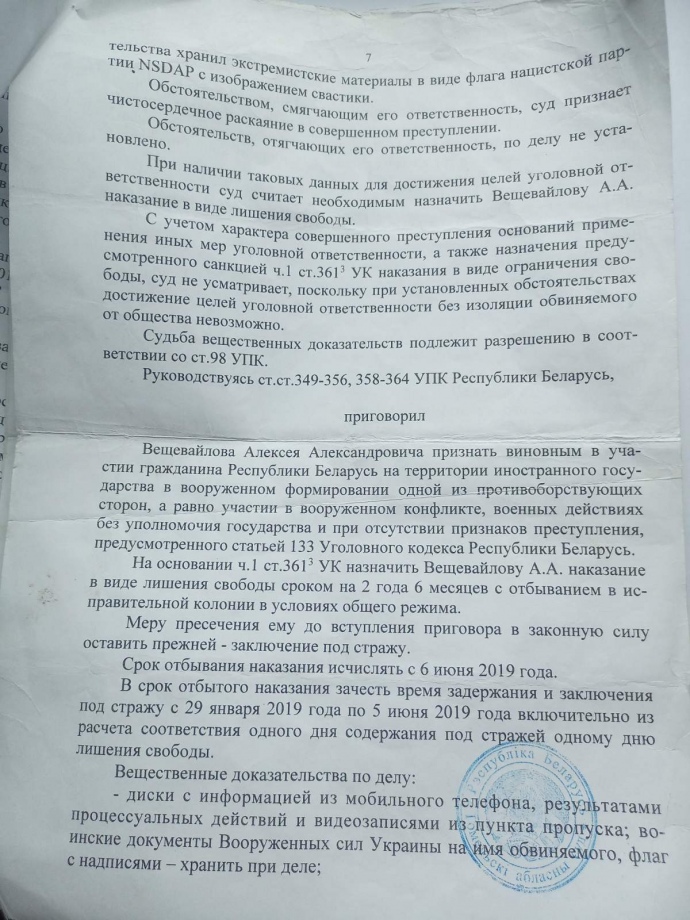
Aliaksei was found guilty of being a mercenary. He was sentenced to imprisonment for two years and six months.
Aliaksei deliberately pleaded guilty counting on recieving a minimal sentence. Olha Reshetylova, the coordinator of the media initiative for human rights, took an active part in his protection and tried to get him extradited to Ukraine. She faced a big problem – Aliaksei did not even have a Ukrainian residence permit.
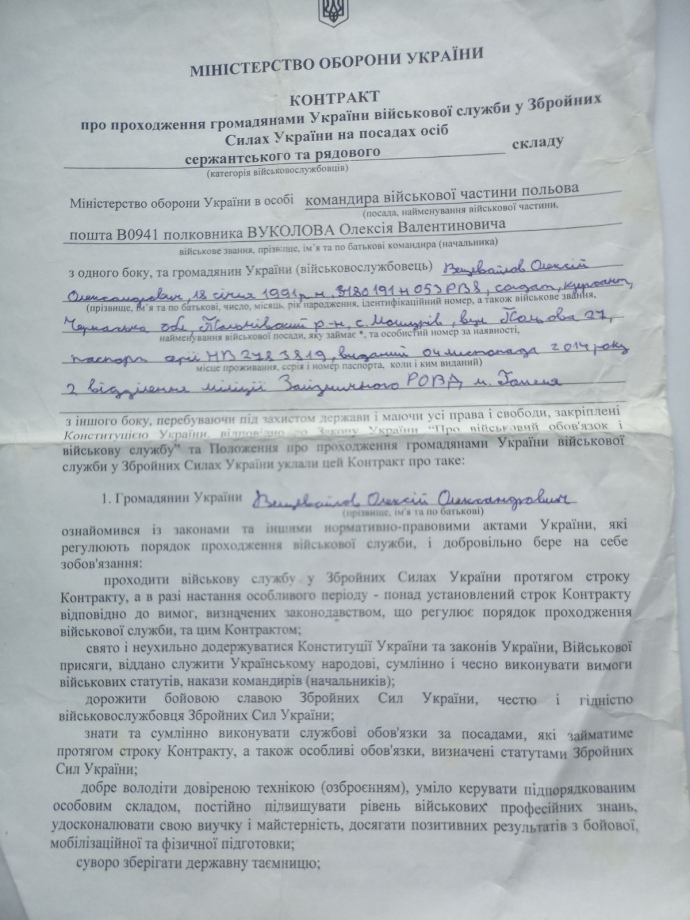
"Basically, he was nobody for the Ukrainian authorities, just a foreign citizen. According to the contract, he had to serve another year to obtain citizenship. But that contract was drawn up in such a way that even if we wanted to we could not use it as a basis for transferring Aliaksei here. After several months of wandering, I contacted Leonid Kuchma [the second president of Ukraine that served from 19 July 1994 to 23 January 2005 – ed.], who was then the head of the negotiations team in Minsk. He sympathised with Aliaksei’s fate and we managed to mitigate the sentence through Lukashenko. And Aliaksei was transferred from the colony to the so-called ‘chemistry’ – forced labour," says Olha Reshetylova.
While in prison, Alexey was thinking of being on the battlefield with his brothers-in-arms.
"He managed to order a cartridge extractor for a machine gun in Ukraine online. And he sent a message telling me to go to a post office and pick it up, so that when he arrives, he could immediately go to war with it," Yurii Riabyi recalls.
[BANNER5]After his release, Aliaksei came straight back to Ukraine. But here, he faced a problem – in the 72nd Brigade, his absence was considered an arbitrary departure from the military unit. He provided all the necessary documents beginning the long and fruitless process of renewal of military service.
"His documents were being kept for half a year. It seemed several times that everything had passed and then the counterintelligence turned him around. Because they thought that he had been recruited in Belarus and that he could pose danger. But he tried again and again each time to defend his right to fight for Ukraine," says Yurii Riabyi.
Meanwhile, Aliaksei’s duration of stay in Ukraine expired. He could not come back home – he would be deported at the border and denied entry. On 24 February 2022, when the great full-scale war began, Aliaksei packed his belongings and came to the 72nd brigade. He was standing on the training ground when counterintelligence officers approached him and took him outside the military unit.
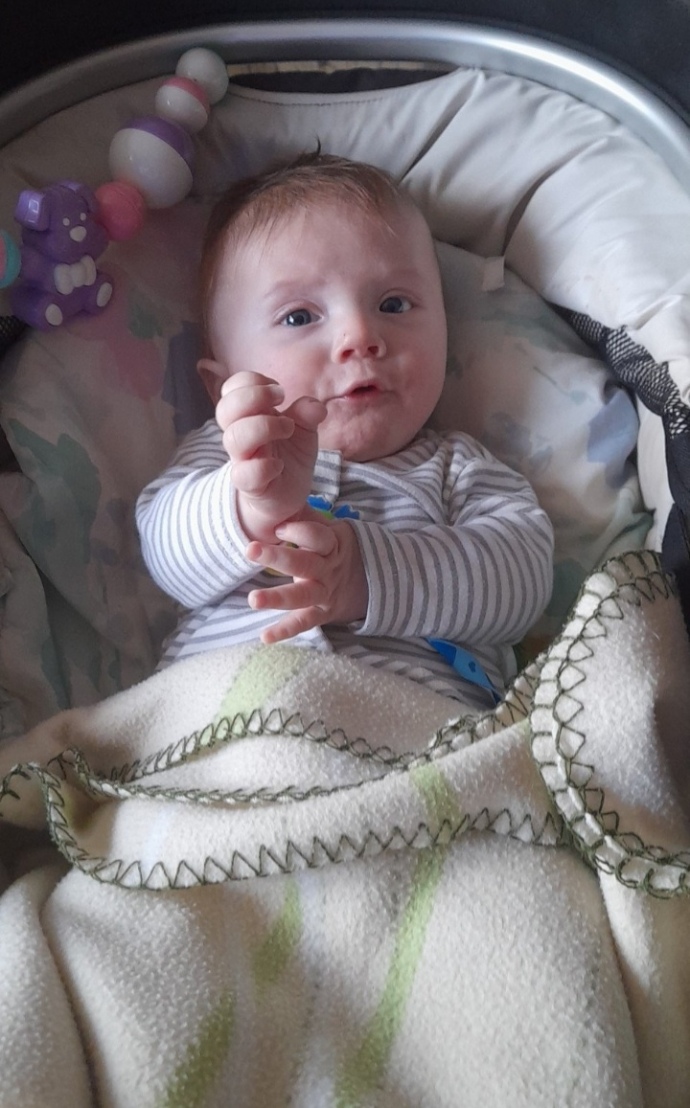
Aliaksei did not give up. He signed up for the Territorial Defence Unit in Bila Tserkva – they accepted him right away because he had previous combat experience. As soon as the International Legion had been created, Aliaksei immediately joined its ranks and headed out to fight. In May 2022, his son Maksym was born. His father saw him only in a photo where the baby was reaching out towards the lens.
On 30 September 2022, the Erzya National Congress was going to take place in Estonia. Aliaksei received an invitation and had every opportunity to go – he managed to obtain the necessary documents. But he changed his mind at the last moment – he did not want to leave his friends. Instead, he recorded a video message to the congress delegates from the frontline. As it turned out, it was his last one.
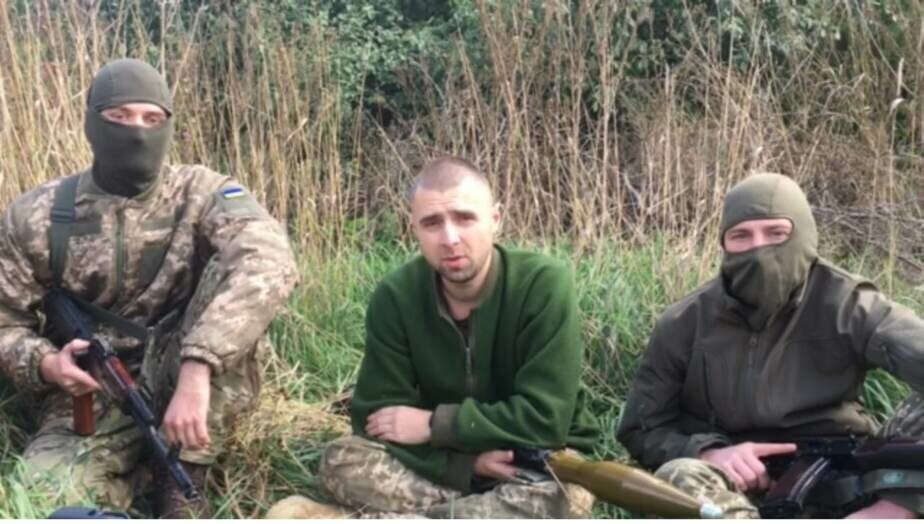
"My goal at this congress is to call on all representatives of the Finno-Hungarian peoples to rise up in the fight against the dictator Putin. Without victory in Ukraine, we will not be able to talk about the liberation of our lands. A lot has been said about the oppression of our languages, cultures and history. We need to show our firm will and fight for our values not in words but in actions. Therefore, I call on those who can fight to join the ranks of the Armed Forces of Ukraine with arms in their hands," said Aliaksei in his address.
On 26 September 2022, he and his brothers-in-arms set up positions near the village of Zaitseve which is near Bakhmut. Aliaksei was digging a trench when the Russians started firing from grenade launchers. The third shell exploded over the trench. A fragment hit Aliaksei in the head.
"The guys tried to perform cardiopulmonary resuscitation. Unsuccessfully. He died in their arms," says Yurii Riabyi.
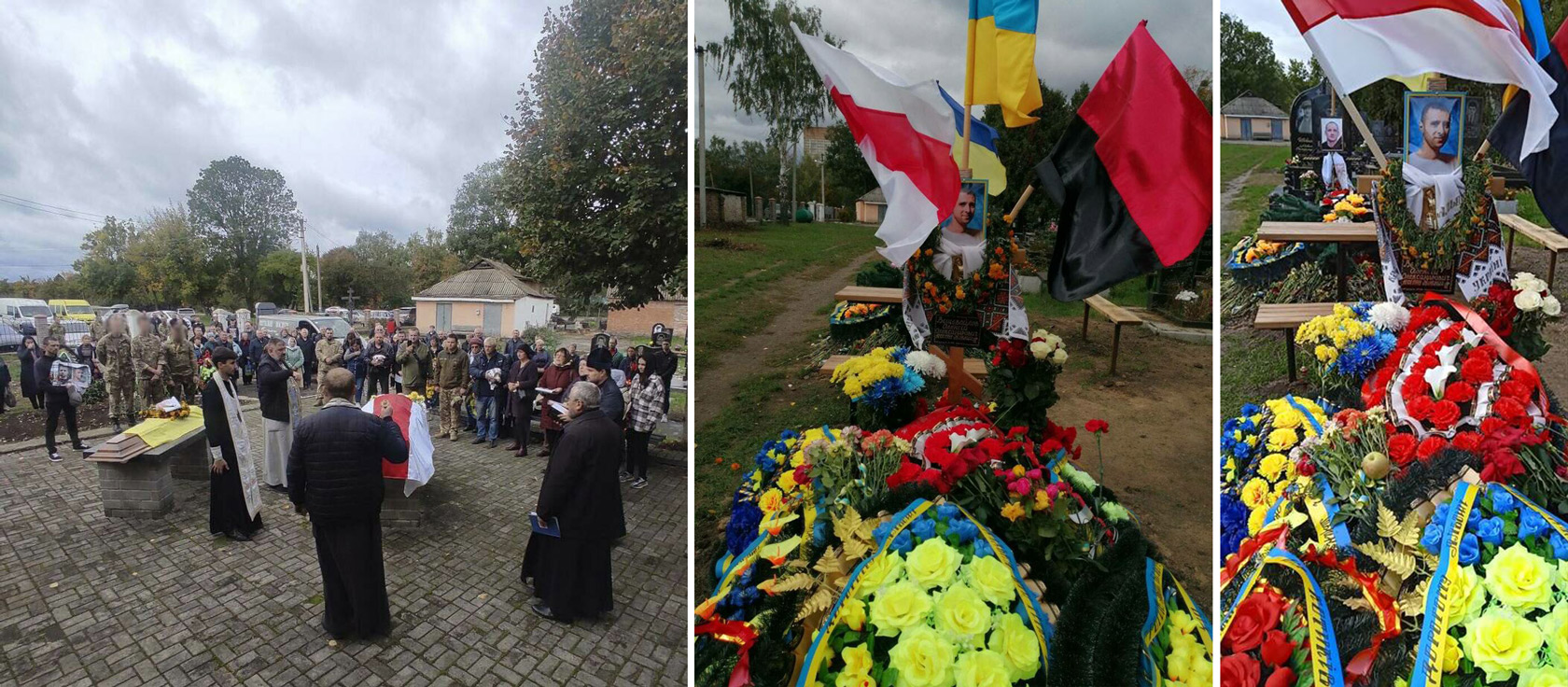
Aliaksei was buried in Talne, Cherkasy Oblast. His friends and brothers-in-arms accompanied him on his last journey. Three flags are flying over his grave: yellow and blue, red and black, and white, red and white – the national flag of the free Belarus. No one from his family was able to attend his funeral – in Belarus, Aliaksei’s relatives are still closely watched by the KGB.
In September, Yurii Riabyi wanted to install a monument to Oleksiy. But together with his fellow soldiers, Yurii believes that the best tribute to the fallen defender would be to posthumously grant him Ukrainian citizenship.
"He gave his life for our country, we cannot forget that, and we must be grateful for his heroism, so that his memory will always live on. And the least we must do is to ensure that he is given the citizenship of the country for which he died," says Yurii Riabyi.
Author: Volodymyr Mysan-Miliasevych